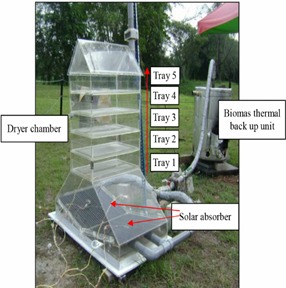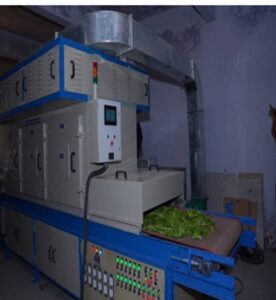Strengthening EU-Africa collaboration in the tech space to catalyse access to affordable and scalable technology for Africa’s agricultural sector
- 08
- Nov

Reflection on our food
The World Food Day on 15 October 2021 has come and gone. This was a perfect day to reflect on our food, its production, handling, and distribution together with the actors in the food system. Food is a vital part of our human existence and increasingly, it has become an important national and regional security asset, determinant of stability and human progress especially agro-industrialization. Without food, other sectors will be at their weakest point of existence be it energy, health, transport, or the financial sector since people irrespective of which sector they belong have to eat and the associated feedback loops are important components that keep these other sectors functioning.
Farmers at the heart of our food system and economic growth
Farmers are important players in the food and food processes, they are an integral part of the food system and the world owes them quite a lot in gratitude. Within Africa, especially sub-Saharan Africa, smallholder farmers are the most important food producers that account for over 80% of the food produced, processed, and distributed in the region against 33% of the global food according to FAO. Throughout the past millennia Africa’s smallholder farmers were primarily preoccupied with subsistence agricultural production, this defined the continent’s food system.
Gradually, into the 21st century, the sector is becoming an important business asset, growing in business volume, scale, and importance. In fact, the next wealth over the continent is not that created out of its rich mineral deposits but from its agrifood system; agribusiness and agro-industrialization. The continent is poised to feed the world in the coming decades as the global food demand rises amidst the rising population.
How Africa can feed itself
However, for Africa to feed itself, the following has to take place.
First, it must need to turn around its negative food budgets that are leading the continent to be a net food importer.
Second, it must upgrade its agricultural technology to reduce drudgery and raise the quality of its food.
Third, it must increase the skills levels of its smallholder farmers through better-structured and sustainable models of farmer organisation.
Fourth, sustained investment in the continent’s agrifood systems is critical and needs to be approached in light of the regional dimensions such as considerations being put forward under the European Green Deal. This is critical because simply increasing productivity alone in the continent will not spur the needed boom in its agribusiness; it may rather cause a pump-up of poverty among smallholder farmers if productivity without a clear and structured market leads to a collapse of agro-products prices in the region.
In this article, we argue the second issue of agro-technology advancement, technology transfer, adaptation, access, affordability, and scalability of useable and appropriate technology. Whilst we do not seek to advocate for imposing European-level technology in Africa’s agrifood system, we recognize that the current on-farm and off-farm practices limit farmer progress. In fact, smallholder agriculture dominated food system as it is currently in the continent is a strong perpetrator of poverty yet at the same time, it offers an important conduit for lifting millions of people in the continent out of poverty only if the correct investments are made including in technology and innovation. In its current state, the continent presents two important directions; first, there is a renewed outlook and focus on Africa from across the world. What Africa can strategically do with this renewed focus and plausible investment, rests on how organised the continent can be as well as how far it can withstand the pressures that come with this courting.
Second, the African Continental Free Trade Area (AfCFTA) offers a promise of hope to provide internal market dynamism for the continent without looking outside of it. Currently, there is limited trade within African countries than there is between Africa and countries outside the continent.
Technology and innovation key factors in Africa transformation. The way forward for Africa

Microwave oven dryers
But, for Africa to take advantage of this ‘rain’, it also must accept the mud that comes with it. Doing so requires innovation and innovation in the local context whilst addressing global challenges and providing global solutions. What the smallholder farmers in the continent need are simple, affordable, accessible, and scalable technologies to improve their farming processes.
First, whilst talking of technology, it ought to be interpreted in the broader context of technologies, innovations, and management practices relevant to the agrifood system. Europe has over the years had advancements in agriculture, under the current EU Green Deal and with the Africa Agenda 2063; we think that there is an opportunity for reactivation of partnerships that strengthen collaboration between Africa and Europe. As both roadmaps touch on several areas; agriculture (“Farm to Fork” policy here applies) and technology (scale commercial applications of green technology innovations and markets creation). The context will remain important and the African Union in this case needs to certainly up its game to avoid over-dependence on western technologies tendencies of modern-day times.
Again, sustainably strengthening EU-Africa collaboration in the tech space requires addressing the fundaments around which Africa’s tech space has been weak and sluggishly growing over the years. The bedrock is investing in its human capital development, skills advancement, and innovation capacity. If technology adaptation and sustainable access to affordable technologies and innovations are things to be realized in Africa in the next decade, parachuting innovations should not be a considered pathway but rather a collaborative build of technologies required in the continent by strengthening local level capacity. Accordingly, investment in African-based tech space collaborating with European tech space is a vital imperative.
Furthermore, investing in higher education in Africa for innovation generation and Technical and Vocational Education and Training (TVET) for technology adaptation and translation will go a long way in strengthening collaboration to catalyse access to affordable and scalable technology in Africa’s agricultural sector. These will make it possible for smallholder farmers in Africa to access simple but transformative technologies such as energy solutions for agriculture including solar-based systems for irrigation, drying, conservation, and precision agriculture.
Accessing affordable technology in Africa
Translating these aspirations will require two additional things to happen; first, African governments must recognize that investing in their people is investing in the competitiveness of their countries and continent as a whole. If Africa is to realise the benefits of its agrifood system and translate the expanses of arable land it pauses, its people must be educated and skilled, innovative, and competitive to drive internal and regional progress.
Second, Europe needs to recognize that collaboration and partnership on an unequal footing is not collaboration and/or partnership at all. Recalling that colonial legacy interrupted the progress of Africa as a continent even in its own advancement of education, it is critical to rebuilding society through investment in education including agricultural extension and advisory services. It is only then that collaboration in tech space can be meaningful, otherwise, whatever technologies that will be shared with the continent whether green or brown, will certainly be ‘white elephants’.
Finally, subsiding tech companies bot in Africa and in Europe for instance so that they can supply technologies to end-users at affordable prices will be key in the transformation of Africa in the tech space.
AfriFood is focused on delivering technologies and innovations to enrich the lives of communities in Africa especially smallholder farmers. AfriFood delivers its services through an integrative and holistic approach that ensures that research, inclusive and affordable finance, logistics and supply chains, skills for employability and competitiveness, and resilience building in Africa’s food systems can be realized.
EuroAfri Link helps to foster Africa’s economic competitiveness by enforcing international standards and qualities in trade between Europe and Africa. As an advocate at the EU Tech Chamber (EUTECH), the strong focus here is on technology in food & agri value chains, to promote productivity and food quality that meets EU standards and requirements. This will be key for Africa’s transformation and positioning herself on the world stage.
Authors: Dr. Anthony Egeru (PhD), professor at Makerere University. Uganda at the Department of Environmental Management, Regional Programme Coordinator at the Regional Universities Forum for Capacity Building in Agriculture (RUFORUM), and Executive Director, AfriFood, Patience Chindong @EuroAfri Link, and Mr Mboh Michael, RDCA – SAPEP Cameroon for the great pictures.
